Tech bros love talking about microdosing – but the legality of psychedelics is a messy grey area
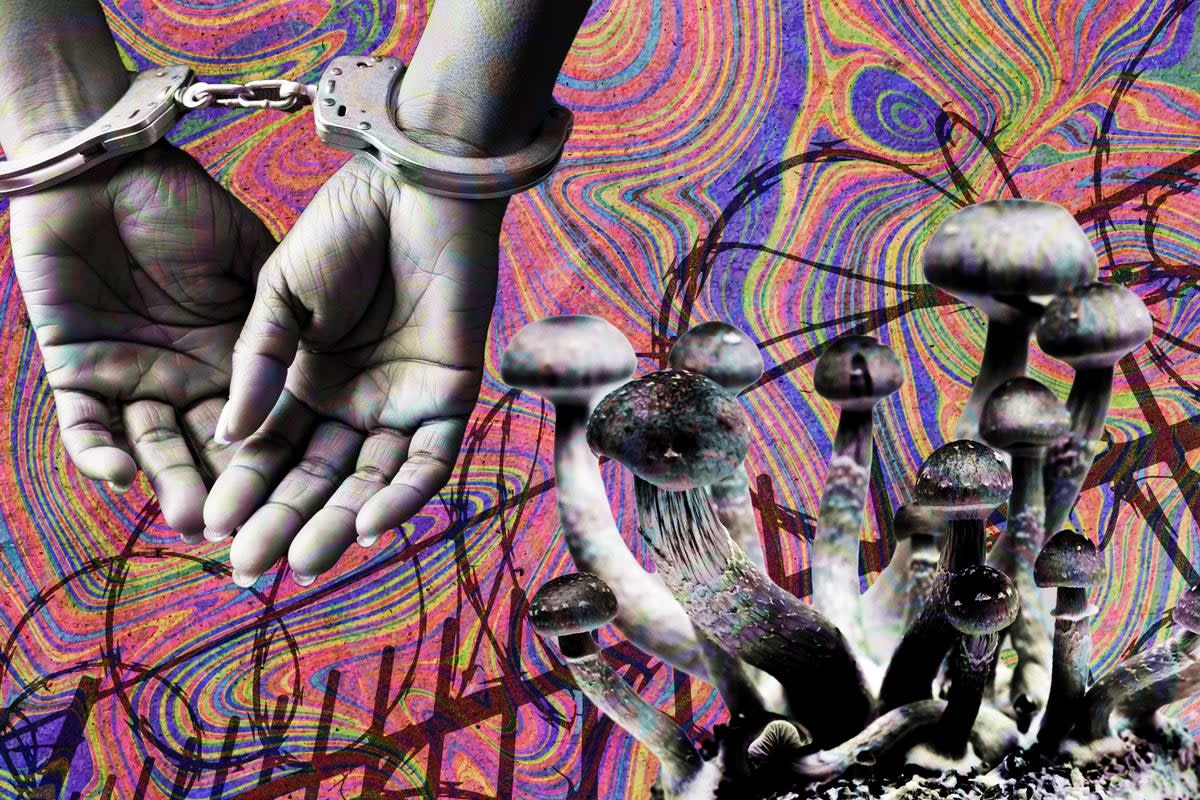
Vince Kadlubek’s company was nearing mainstream success when it began to feel weird that he couldn’t talk about psychedelics.
Back in 2015, Kadlubek had co-founded Meow Wolf – a Santa-Fe-based art collective that makes trippy, immersive installations. In 2019, stressed to breaking point, he had passed the baton to a new, more culturally conservative leadership, tasked with securing capital to expand into other cities.
Yet even as he continued to advise the company, Kadlubek was undergoing a "transformative" healing process thanks to 5-MeO-DMT, a hallucinogenic chemical secreted by the Colorado River toad that is highly illegal in the US. As a gay man, he’d never felt any pressure to hide his sexuality in the business world; somehow, he knew this was different.
"I was thinking to myself: man, I can’t even bring up the word ‘psychedelic’ at a board meeting without people getting freaked out," said Kadlubek last Thursday during a panel discussion at Discovery Sessions, an interdisciplinary psychedelics conference in San Francisco.
"It’s so f***ed up. We’re very psychedelic – we’re inspired by LSD, mushrooms – and you can’t even talk about it."
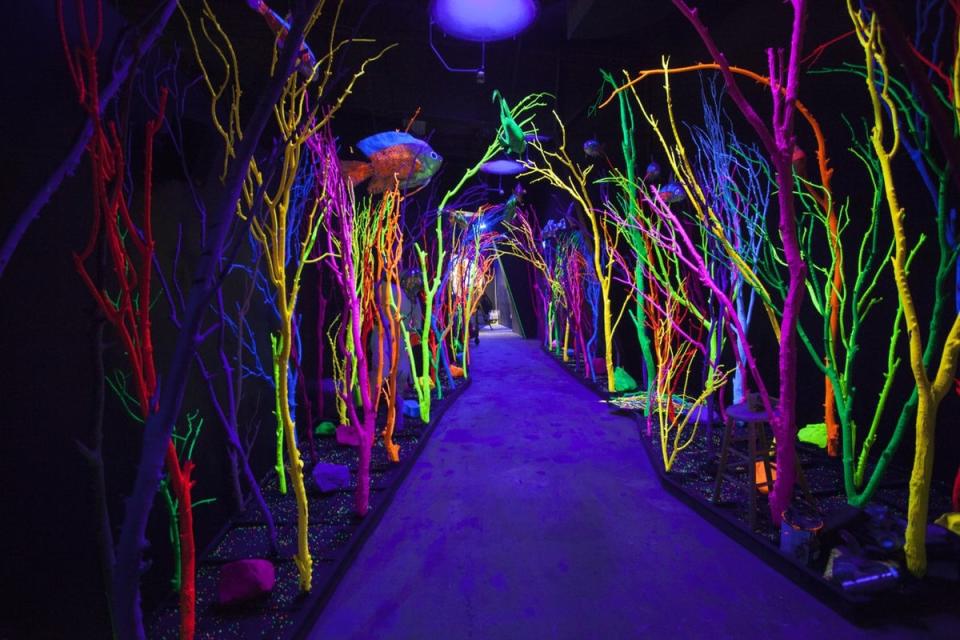
Kadlubek’s experience is emblematic of the strange border zone that psychedelic substances now occupy in American society. Once harshly punished as part of the US war on drugs, hallucinogens such as ketamine, MDMA, and psilocybin – the psychoactive ingredient in magic mushrooms – are increasingly coming out of the shadows.
Numerous US states and cities have passed laws to research, decriminalise, or even legalise psychedelic drugs, while scientific studies across the world are finding evidence of medical benefits. Big Pharma is interested too, with investors reportedly ploughing nearly $3.6bn into the sector since 2020.
Meanwhile "microdosing" has also become a common practice in Silicon Valley, with high-profile executives such as Elon Musk and Google co-founder Sergey Brin speaking openly about their use of ketamine and psilocybin respectively. Even Prince Harry, the younger scion of the British monarchy, has talked about how psychedelics helped him heal from trauma.
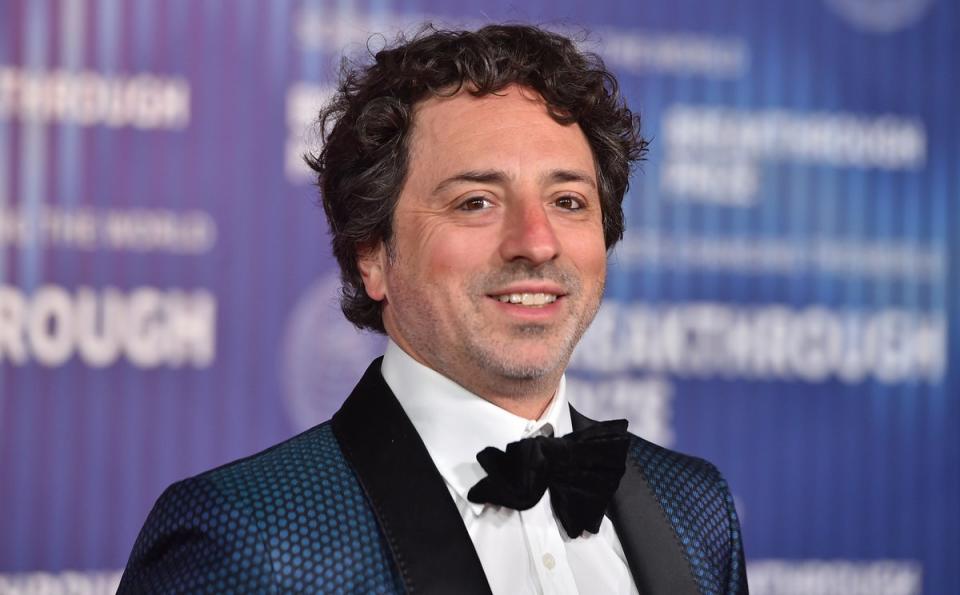
"There really is a critical mass of intelligent people collectively coming together to say that we need to change policy around mushrooms – that we need to take them from the underground and put them into the mainstream in a safe and responsible way," Dennis Walker, a mushroom podcaster and business adviser, told The Independent. "Because these are profound and effective treatments for many indications, and they’re also the birthright of human beings."
Even so, many of these drugs remain highly illegal under federal law, endangering anyone who tries to make a living from them. Fifty years of handcuffs and lab busts have left deep scars on the community, and its underground nature means the line between medicine and recreation isn’t always clear.
"When I go and talk to the people who survived the Sixties and Seventies and Eighties, I have to approach them carefully, because they remember a time when they risked arrest and imprisonment," John Mitchell, one of the conference organisers, told The Independent.
I don’t have much faith in the United States government.
Kanyon Coyote Woman Sayers-Roods
"Whereas the kids have no clue [about that] – they’re just so open and easy to talk about it."
Those scars are especially grievous for native Americans, some of whom have centuries or millennia-old traditions of psychedelics as a sacrament, and whose wholesale dispossession by the expanding USA is considered by many scholars to have been a genocide.
"I don’t have much faith in the United States government," Kanyon Coyote Woman Sayers-Roods, a cultural consultant and member of the Ohlone and Chumash peoples, told The Independent.
"The United States is a foreign governing structure. So for an outside community saying that they can stake claim and investment in something that they know nothing about, and put parameters around it – I find that problematic."
Psychedelics reach a social tipping point
The attendees at Discovery Sessions last week were a motley crew. Biomedical researchers and drug policy activists rubbed shoulders with magic mushroom growers, spiritual healers, and Silicon Valley venture capitalists.
Held on the ancestral territory of the Ramaytush Ohlone people, the conference hosted sessions on everything from medical breakthroughs through justice for indigenous Americans to the role of psychedelic drugs in rave culture. One panel discussed the funding landscape for psychedelic start-ups, while another offered advice on "how to build a modern psychedelic mystery cult (and how to destroy one if it goes badly)".
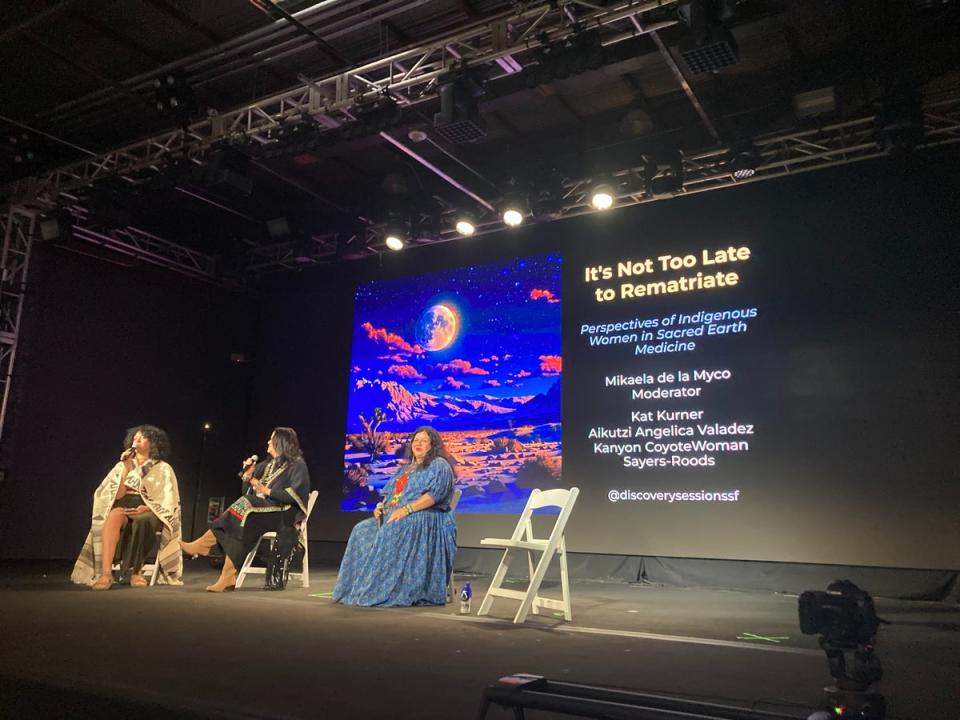
Meanwhile, market stalls sold vintage LSD blotter paper (not loaded with any drug), kaleidoscopic art, superfood supplements, and kanna extract. A VIP afterparty on Thursday night featured a live demonstration of how hallucinogens affect human brain waves, with organiser Mitchell as the guinea pig.
The second day of the conference coincided with Bicycle Day, which commemorates the fateful afternoon in 1943 when Swiss chemist Albert Hofmann experimentally ingested what he believed to be a small dose of LSD and then attempted to cycle home.
None of this, Mitchell told The Independent, would have been possible if acceptance of psychedelics in the US had not reached a "social tipping point".
Not so long ago, most of these drugs were legal in the US. Hofmann’s discovery, and white Americans’ increasing interest in traditional psychedelics such as peyote, helped kickstart the countercultural revolution of the 1960s and persuaded many people that America was on the cusp of a comprehensive spiritual transformation.
Things changed in 1970 with the passage of the Controlled Substances Act, which put LSD, peyote, psilocybin, MDMA, DMT and numerous other psychedelic substances in the highest category of illegal drugs, alongside heroin and cocaine.
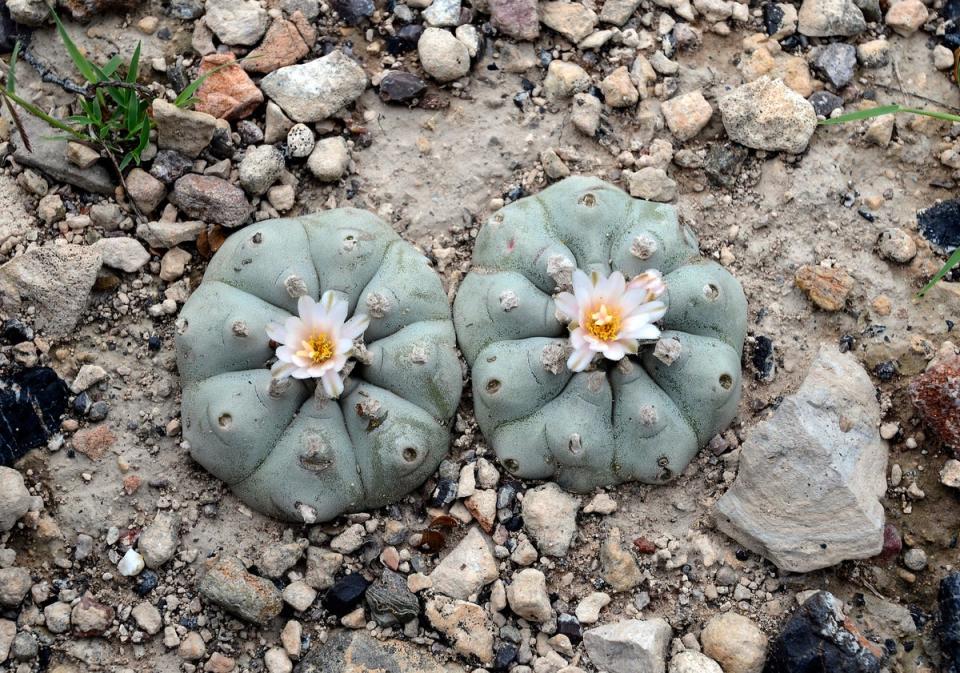
The following year Nixon officially declared an all-out "war on drugs", which was maintained by his successors and massively expanded by Ronald Reagan in the Eighties. One former Nixon aide has since alleged that it was a deliberate ploy to criminalise the Black and hippie communities. Though historians have challenged that claim, both groups were devastated nonetheless.
Still, psychedelic subculture survived, and many of its believers never gave up. To them, explains Dennis Walker, the drug war was a temporary historical aberration. They saw psychedelics as profoundly beneficial, even holy, and felt a moral duty to preserve them for future generations.
Piece by piece, that future now seems to be arriving. New technology and relaxed regulations have led to a boom in psychedelic research, seeking potential treatments for depression, anxiety, PTSD, and other conditions. Racial justice activists have pushed for an end to the drug war, highlighting its disproportionate effect on Black people.
In recent years, US military veterans have also joined the charge, arguing that psychedelics could help heal the nation’s epidemic of suicide among former servicefolk.
But the war isn’t over yet.
‘There’s still this never-ending fear’
In October, California governor Gavin Newsom vetoed a bill that would have decriminalised psilocybin and several other hallucinogenics. Last month, Oregon partially reversed its historic drug decriminalisation law following a massive spike in fentanyl overdoses (although some research suggests that the law did not cause the surge).
"Despite all the work we’ve done, just talking about this on the record or in a government context is dangerous," said Larry Norris, a drug researcher and national director of the campaign group Decriminalize Nature, in a panel discussion about psychedelics entrepreneurship at Discovery Sessions.
"We’ve got to do all we can to make it so that if somebody talks about this, they don’t have to worry about their kids or their jobs."
Niko Summers, a herbalist and shamanic medicine practitioner, described the constant risk that attends his working life. "It’s always going in my mind, right? As an African-American person, there’s still this never-ending fear. That’s why I got involved with decriminalisation… we’re kind of in a grey area."
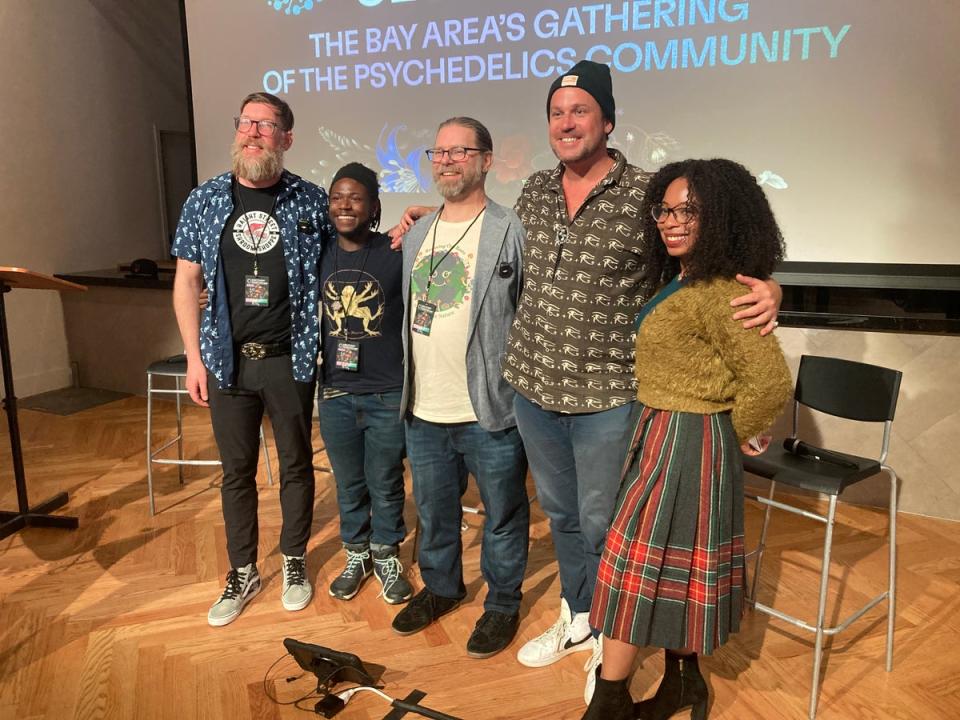
Sayers-Roods similarly says that, although there are now legal protections for native Americans using psychedelics for religious purposes, she still tenses up when she sees police due to countless stories from older relatives about officers brutalising her community.
Another event at Discovery Sessions was a live interview with Steve Gill, a "clandestine chemist" who was jailed making MDMA, intended to raise money for his legal fees.
Indeed, Mitchell told The Independent that the conference had to impose rules against selling magic mushrooms and other drugs on the premises, and turn down many vendors who wanted to do so, even though San Francisco has effectively decriminalised "plant-based psychedelic substances". "We are not a psychedelic conference; we’re a psychedelics conference," he said.
Psychedelic entrepreneurs often square this circle by building their business around guiding and facilitating other people’s trips, or offering education, instead of distributing actual drugs.
The shadow isn’t just legal but emotional and cultural. "There’s all these people of [the older] generation who are locked up in prison, or lost their careers, or whose names are being forgotten," said Kadlubek at his panel, whose topic was "Bridging the Generational Divide".
Panellists described how the drug war has severed younger psychedelic enthusiasts from their elders and cut off from hard-earned wisdom about how to handle such drugs safely. One person described a recent incident in which a younger person in an encrypted group chat cheerfully asked where they could buy magic mushrooms, and had to be told: "Please don’t entrap your friends!"
Most conference attendees expressed hope about the future of psychedelics – but not without reservation. Meow Wolf now operates in four cities, going on five, and Kadlubek told The Independent that he now feels far more open discussing his experiences than he did in 2021.
Nevertheless, commercial interest in psychedelic medicine dropped off sharply in 2022 and 2023, partly due to the worldwide rise in interest rates and partly due to doubts over how easily such drugs can be commercialised. According to Lisa Evia, a cannabis and psychedelics investor, the patchwork state of US regulation remains a major deterrent.
Even if that changes, many people worry about what commercial exploitation, government oversight, and integration into the American medical system will do to the subculture they cherish. Some fear a coming "gentrification of consciousness" in which marginalised groups are locked out of psychedelic medicine, and indigenous Americans denied their fair share of the proceeds from natural compounds they have cultivated and guarded for generations.
"I recognise how legality within these systems can be helpful in civil governance," said Sayers-Roods. "Yet… it can’t be some well-intended rich white guy, who maintains the glorious buildings and the bougie environments. It has to be indigenous-led."

